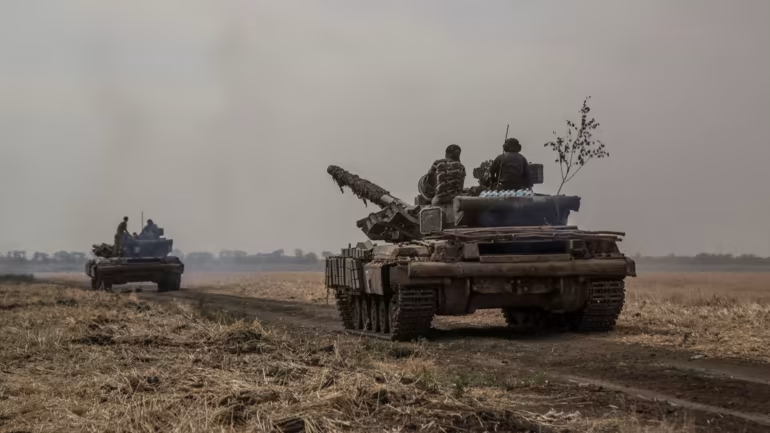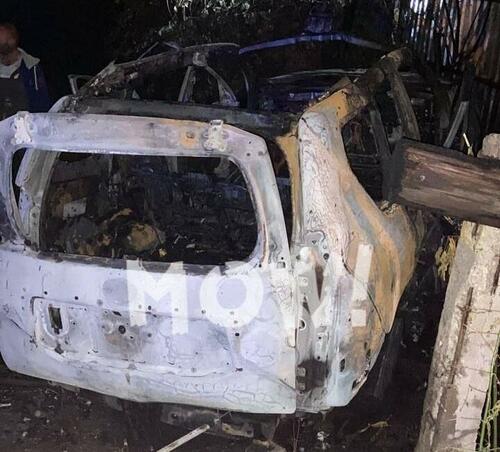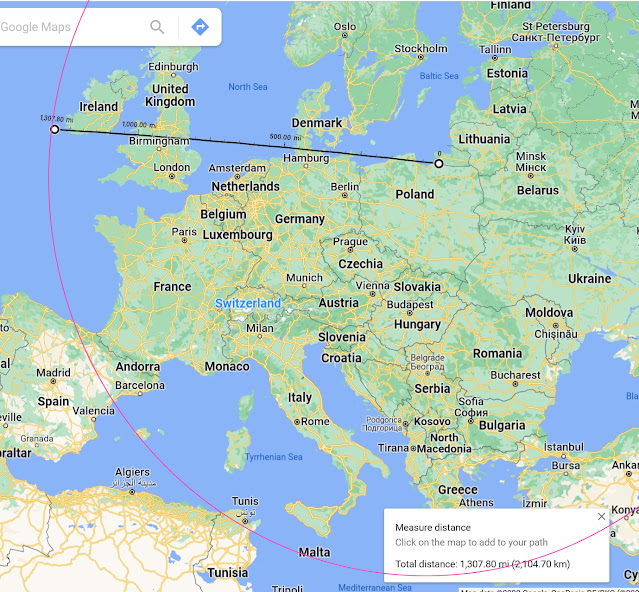*** MILITARY SITUATION ***
On Monday Ukraine's forces launched a much anticipated 'counteroffensive' focused on taking back territory in the south of the country, which is among the first portions of Ukraine which Russia seized soon after starting its invasion six months ago. The operation is said to reflect a growing "confidence" in Kiev that American military aid will continue to flow and even grow. "Today we started offensive actions in various directions, including in the Kherson region," a Ukrainian public broadcaster announced based on state officials.
Ukrainian journalist Natalia Humeniuk admitted that Russian forces in the south are still "quite powerful" but that Ukraine's forces have "unquestionably weakened the enemy" - which Russia's Crimea governor Sergei Aksyonov dismissed as "another fake of Ukrainian propaganda." And the White House said that Russia has already had to "pull resources" from fighting in Donbas in order to defend the south. Like with many prior major battlefield events, two competing narratives are quickly emerging. US officials including a number of Congressmen expressed their immediate optimism upon that start of the southern counteroffensive.
National Security Council spokesman John Kirby on Monday said the following:
"Regardless of the size, scale and scope of this counter-offensive that they’ve talked about today, they have already had an impact on Russia’s military capabilities," Kirby said. "The Russians have had to pull resources from the east simply because of reports that the Ukrainians might be going more on the offence in the south — they’ve had to deplete certain units from certain areas in the east and the Donbas."
"The idea of going on the offence is not new to Ukrainians, and they have been taking the fight to the Russians inside their country," Kirby added. "In fact, with some of the assistance that they’ve gotten from US weapons as well as others, such as Himars, they’ve been able to actually strike behind Russian lines and put the Russians more on defense."
The statement appeared to be confirmation that Washington is positively encouraging this fresh offensive aimed at penetrating Russian lines in the south. Kirby also weighed in on the continued standoff at the Zaporizhzhia nuclear power plant in southeastern Ukraine at a moment an IAEA team has been dispatched to inspect the site. He urged a "controlled shutdown" in order to protect it, something the Russian occupying forces are unlikely to heed. Kirby called it "the safest and least-risky option in the near term" - but then there would be the question of Ukrainians keeping the lights on headed into winter.
But by Monday's close, Russia's defense ministry proclaimed the Ukrainian counter-offensive has "failed miserably", per state media:
Ukrainian forces attempted to attack in three directions on orders of President Vladimir Zelensky but made no gains, Moscow said.
Russian troops caused "great losses" to the Ukrainian attackers during the day’s battles, including 26 tanks, 23 armored fighting vehicles, nine more armored vehicles, two SU-25 ground-attack jets and more than 560 troops, the Russian Defense Ministry said in a statement on Monday evening.
Likely the truth will emerge amid the conflicting narratives within the next days or even weeks. Russia still aims for full 'liberation' of the Donbas as a prime battlefield objective at this point.
-On August 29, the Armed Forces of Ukraine (AFU) launched a counteroffensive in the southern Ukrainian regions of Kherson and Mykolaiv. So far, no significant gains have been achieved. The Russian military continues to deter the enemy advance on the front lines.
Prior to the attacks on the front lines, the AFU launched a massive shelling of Novaya Kakhovka and Berislav in the Kherson region on the night of August 28-29. At least 1 ammunition depot was reportedly destroyed and a barge used for crossing the Dnieper was damaged. In the evening, the AFU began to strike at the Antonovsky Bridge near the city of Kherson, trying to deprive the Russian Armed Forces of the opportunity to transfer reinforcements. The Russian Air Defence Forces are active in the area.
Then the ground forces went on the offensive from several directions. The front line was divided in three maint parts.
In the southern area, the AFU developed the counteroffensive from their positions in Luparevo towards the village of Alexandrovka located on the Black Sea coast. According to Russian military sources, the AFU failed to develop any offensive in the area and were pushed back to their positions. As a result of the operation, they reportedly lost three tanks.
Another offensive was carried out along the Mykolaiv- Kherson road. The AFU attacked from their military positions in the village of Posad-Pokrovsky located on the highway. The offensive was carried out in teo directions. The assault groups headed towards Pravdino and the city of Kherson. So far, the AFU reportedly managed to advance about 10 kilometers and reach the village of Kiselevka. However, the attack was repelled and they were forced to step back towards the village of Soldatskoe. Fierce clashes continue in Pravdino and Kiselevka.
In the area of the town of Snigerevka, the AFU attempted to advance towards Blagodatnoe located on the road to Mykolaiv, 20 kilometers to the west of Snigerevka. The assault was carried out from the Ukrainian positions in Pervomaiskoe. After the reported loss of two infantry fighting vehicles and a dozen of servicemen, the AFU retreated.
The military operations of the AFU in the southern area were carried out by small assault groups which suffered significant losses in manpower due to heavy response fire by Russian artillery. The counteroffensive along the Black Sea coast was likely aimed at destruction of the Russian military from the main blow inflicted in the areas to the north.
Another direction of the Ukrainian counteroffensive is the region of Davidov Brod.
The AFU are in control of the village of Andreevka on the left bank of the Ingulets river to the south of Davidov Brod. Heavy clashes have been ongoing in this region as Russian forces attempted to repel the AFU to the right bank of the river and destroy the pontoon bridge in area.
Today, one tank and two infantry battalions of the 36th separate Brigade of the AFU Marines managed to cross the river and attack Russian forces from their positions in Andreevka. The Ukrainian military divided their strike forces. The first assault group cut the road to Blagodatovka and tried to break into the village, but failed. Another assault group managed to advance 5 kilometers to the east and temporarily take control of the small village of Sukhoi Stavok. Later in the evening, Russian forces partially destroyed the armored vehicles of the AFU in Sukhoi Stavok and Ukrainian troops were forced to withdraw to a wooded area on the outskirts.
Another assault group of more than 10 armored vehicles attacked Russian forces in the village of Lozove located 2 kilometers to the north of Andreevka on the left bank of the Ingulets river. So far, they have reportedly succeeded to expand their stronghold on the left bank. The village of Lozove reportedly came under Ukrainian control.
At the same time, the AFU failed to cross the Ingulets River and create a bridgehead near the village of Malaya Alexandrovka located to the north of the town of Davidov Brod. The AFU suffered heavy losses in manpower and equipment.
The AFU are currently reinforcing their positions near Davydov Brod, Blagodatnoye and Vysokopolye. Another breakthrough attempt is expected in the coming hours.
On the northern front lines, the AFU blockaded the Russian grouping deployed on the southern outskirts of Olgino and Vysokopilya. Russian units are holding the defense in the are, but Ukrainian forces cut the roads to the settlements with heavy artillery fire.
To the east of Visokopilya, the AFU attacked the Russian positions in the area of the villages of Lybimovka and Mirolybovka. They failed to advance. The counter attack was repelled.
So far, the Ukrainian military has managed to achieve only limited success in the Andreevka region, however it is yet to develop the advance to the east. At the same time, the offensive in the steppes will result heavy losses and it may lead to no significant results without any gains on the other front lines.
The Russian Ministry of Defence confirmed that the AFU launched a large counter offensive, claiming that it had already resulted in heavy losses.
In turn, the General Staff of the Armed Forces of Ukraine is yet to comment on the military operations on the southern front lines. On August 29, the Ukrainian military only reported some offensive actions of Russian troops near the village of Potemkino.
*** ECONOMIC & POLITICAL ***
-The American embassy in Baghdad has reportedly engaged inbound rocket attacks with its air defense system, the C-RAM which protects aerial threats against the Green Zone. Some reports suggest the streets have finally grown calmer in the early morning hours (local time), but this is after an evening and overnight death toll of at least 15, including unconfirmed reports of police casualties. AFP citing local medical sources also says some 350 protesters were injured.
-An Israeli official said that the US hinted it was preparing a military option against Iran during a meeting between Israeli Defense Minister Benny Gantz and US National Security Advisor Jake Sullivan on Friday, The Times of Israel reported. The Israeli official said that Gantz told Sullivan that Israel "needs" the US to have a credible military option against Iran. The meeting came as Washington and Tehran are engaged in negotiations to revive the nuclear deal.
-By all accounts the situation into the overnight hours (local time) Baghdad has continued to spiral, with one well-known regional Mideast correspondent describing a "full implosion" - despite security forces attempting to enforce a strict curfew meant to clear the streets. The Republican Palace, which is where Iraq's gridlocked parliament meets (though which has now been suspended by acting prime minister Mustafa al-Kadhimi), was occupied by armed protesters earlier in the evening. CNN reports of the latest, "At least five people have been killed and more than 40 have been injured in violent clashes that erupted in Baghdad’s heavily fortified Green Zone on Monday, following an announcement by powerful Iraqi Shia cleric Muqtada al-Sadr that he was withdrawing from political life, medical sources told CNN." Earlier, though unconfirmed reports, said at least eight had died amid clashes with police. These numbers were quickly updated and the death toll is expected to go higher into the night: At least 12 protestors killed (AFP), 2 security members killed (Arabiya). State trying to impose a curfew but situation is out of hand. Protestors aggravated by status quo, militias roaming Baghdad, Gov MIA... Long night for Iraq," Joyce Karam summarizes.
-Russia’s FSB security service has accused another Ukrainian of being part of a team that killed Darya Dugina, the daughter of ultra-nationalist Alexander Dugin. The FSB said it had now identified what it called another member of a Ukrainian “sabotage and terrorist group” which it said had plotted and carried out the killing. Ukraine has denied involvement in the murder of Dugina.
-Ukraine’s foreign ministry confirmed the IAEA trip to the Zaporizhzhia nuclear plant. The mission left Vienna and is due to arrive in Kyiv on Monday, ministry spokesperson Oleg Nikolenko wrote on Facebook, adding that the team are expected to start work at the plant “in the coming days”.
Moscow welcomes a visit by the UN nuclear watchdog to the Zaporizhzhia plant, a top Russian diplomat said. The Kremlin spokesperson, Dmitry Peskov, said Russia was not considering the possibility of creating a demilitarised zone at the plant.
-More than 3,600 ships from Russia have arrived at US ports since February 24, according to statistics cited by the Associated Press. While that is nearly half of the shipments over the same period compared to last year, it still amounts to over $6 billion in imports. The number of Russian products entering US ports suggests Biden is falling short of his pledge to isolate Moscow’s economy. Due to so-called "wind down" periods that allow companies to complete previous deals, some of the goods continue to enter the country long after the White House announced sanctions on those products, including oil and gas. Paradoxically, other Russian imports, such as fertilizer, came at the request of the Biden administration, which has urged American companies to make up for shortages.
-It was just days ago we wrote about how Ford was hiking the price of its F-150 EV by almost exactly the same amount offered as an EV subsidy in the Biden administration's new "Inflation Reduction Act". While some argued that the price hikes came days before the Act was signed by President Biden, and therefore weren't definitive proof that Ford was just price gouging the government's latest handouts, we think that argument has now officially been put to rest, with Ford now also increasing Mustang Mach-E EV prices between $3,000 and $8,100, depending on Model. The company is "also increasing shipping costs by $200 on all models," according to Automotive News' Michael Martinez.
-With even Zoltan Pozsar warning that Europe faces an apocalypse of sorts now that the Eurussia divorce is complete and energy prices in Europe are hitting fresh daily record highs every single day - just today, German 1Year forward baseload electricity rose above €1000, or 10x where they were a year ago, before easing after European nat gas prices plunged the most since March after Germany said its gas stores are filling up faster than planned ahead of winter.... moments ago the European Union appears to have finally realized that it faces an armed revolt this winter, or worse, when millions face freezing cold without power and heat, and announced that it was planning "urgent steps" to push down soaring power prices, Commission President Ursula von der Leyen said on Monday. "The skyrocketing electricity prices are now exposing, for different reasons, the limitations of our current electricity market design,” von der Leyen said in a speech at the Bled Strategic Summit in Slovenia, pointing out what has been obvious for years to those who warned repeatedly that Europe should probably not take make its energy policy based on the idiotic ravings of a self-absorbed, petulant, Scandinavian teenager. “It was developed under completely different circumstances and completely different purposes.” Ah yes, it's the "circumstances and purposes" that are at fault, not Europe's catastrophic "green" push over the past decade that left the continent at the mercy of Putin, very much as one Donald J Trump warned would happen... and speaking of Putin, maybe Europe can impose a few more self-destructive sanctions on Russian energy exports
-Austrian Chancellor Karl Nehammer called on Sunday for the EU to impose a cap on power prices and decouple electricity charges from the price of gas. The Austrian leader said failure to do so would let Russian President Vladimir Putin “determine the European electricity price.” "We must finally stop the madness that is taking place in energy markets. And that can only happen through a European solution,” read a statement from Nehammer’s office. “Something has to happen at last. This market will not regulate itself in its current form. I call on all the EU 27 to stand together to stop this price explosion immediately.”
-President Vladimir Zelensky said in his daily evening address on Sunday that Ukraine will recapture Donbass, which is now almost fully seized by Russian forces. “We have not forgotten and will not forget any of our cities and any of our people,” he said. “Now Donbass is almost destroyed by Russian strikes, devastated. The proud and glorious Ukrainian Donetsk was humiliated by the Russian occupation and robbed. But Ukraine will return. For sure. Life will return. The dignity of the people of Donbass will return. The ability to live will return. The opportunity to live safely and happily,” Zelensky added. According to him, this is what the Ukrainian flag will symbolize “when we set it up in Donetsk, Gorlovka, Mariupol, in all cities of Donbass, Azov area, in all areas under Russian occupation – in Kharkov, Zaporozhye, Kherson regions. And definitely in Crimea.” “Ukraine remembers everything,” he concluded.
-The US Navy has sent two warships through the Taiwan Strait on Sunday, in a significant first sail through since House Speaker Nancy Pelosi's provocative visit to Taiwan early this month. The guided-missile cruisers USS Antietam and USS Chancellorsville traversed "through waters where high seas freedoms of navigation and overflight apply in accordance with international law," according to the US 7th Fleet in Japan. Calling the transit "ongoing," the statement emphasized "no interference from foreign military forces so far" - which is a concern given the heavy PLA naval presence in waters off Taiwan this month, also given repeat Chinese breaches of the median line by air and sea. "These ships (are transiting) through a corridor in the strait that is beyond the territorial sea of any coastal state. The ships’ transit through the Taiwan Strait demonstrates the United States’ commitment to a free and open Indo-Pacific. The United States military flies, sails, and operates anywhere international law allows," the 7th Fleet statement continued. The Pentagon previewed the sail through pf the strait, announcing over a week ago that the Navy is preparing to do such amid Chinese warnings, but didn't specify a date.
-Beijing has issued its response to anti-China hawk Sen. Marsha Blackburn visiting Taiwan on Thursday and Friday. It began with at least 35 PLA jets buzzing the island's airspace on Friday, including 8 Chinese Navy vessels patrolling off the island. And on Saturday Fox News correspondent Lucas Thomlinson reported "China sends four nuclear-capable bombers near Taiwan Saturday one day after Sen. Marsha Blackburn met Taiwan’s president in Taipei."
-According to Reuters, with Poland still basking in the late summer heat, hundreds of cars and trucks have already lined up at the Lubelski Wegiel Bogdanka coal mine, as householders fearful of winter shortages wait for days and nights to stock up on heating fuel ahead of the coming cold winter in queues reminiscent of communist times. Artur, 57, a pensioner, drove up from Swidnik, some 30 km (18 miles) from the mine in eastern Poland on Tuesday, hoping to buy several tonnes of coal for himself and his family. "Toilets were put up today, but there's no running water," he said, after three nights of sleeping in his small red hatchback in a crawling queue of trucks, tractors towing trailers and private cars. "This is beyond imagination, people are sleeping in their cars. I remember the communist times but it didn't cross my mind that we could return to something even worse." rtur's household is one of the nearly 4 million in Poland that rely on coal for heating (granted, these households are probably in better shape than the ones relying on nat gas whose price is rising by 10-20% every day and is now almost literally in the stratosphere) and now face shortages and price hikes, after Poland and the European Union imposed an embargo on Russian coal following Moscow's invasion of Ukraine in February. Poland banned purchases with an immediate effect in April, while the bloc mandated fading them out by August. While Poland produces over 50 million tonnes from its own mines every year, imported coal, much of it from Russia, is a household staple because of competitive prices and the fact that Russian coal is sold in lumps more suitable for home use.
-German benchmark power prices for next year soared above €800 per megawatt hour on Friday, nearly 10 times higher than the same period last year, Bloomberg reports. Prices gained as much as 7.6% on Friday to reach €805.15 per megawatt hour on the European Energy Exchange, up 39% this week. Costs have been smashing records on an almost daily basis as the winter heating period approaches. The rally is being driven by growing concerns over Russian natural gas supplies via the Nord Stream 1 pipeline. Berlin previously required gas operators to fill underground storage facilities while adhering to a strict schedule, to ensure the country has enough fuel to last the winter. The plan states that storage must be 85% full by October 1, and 95% full by November 1. Experts doubt the goal is achievable.
-Russia is flaring natural gas at the Portovaya plant near the Finnish border while drastically cutting gas flows via the Nord Stream pipeline to Germany, a Rystad Energy analysis shared with BBC News showed on Friday. The plant northwest of St. Petersburg is flaring an estimated around $10 million worth of natural gas per day—gas that would have gone to Germany otherwise.
-Washington is still considering supplying modern combat jets to Ukraine amid its ongoing conflict with Russia, US Under Secretary of Defense Colin Kahl has said. No “final decision,” however, has been made on this matter and actual delivery could take “years” to materialize – while Kiev must in turn be able to “sustain” and “afford” advanced weaponry systems, the official told a press briefing on Wednesday. “As it relates to future aircrafts, fourth generation aircraft, for example, even if we were to provide those now, they wouldn’t arrive for years, so we’ve been focused on, as it relates to their fighter aircraft, on what they need … to support the current efforts to hold in the east and perhaps going on a counter offensive,” Kahl explained, pointing to the recently approved delivery of air-to-surface missiles that can be used by warplanes remaining in the Ukrainian inventory.
-Another US lawmaker arrived in Taiwan on Thursday evening, continuing the series of visits by American officials to the island that started with House Speaker Nancy Pelosi earlier this month. Beijing says the trips are designed to antagonize the Chinese government and lend support to separatists. The Taiwanese foreign ministry said on Thursday that “important guests” would be arriving in Taipei on board a US military transport, according to the Central News Agency. A Fox News producer identified the visitor as Senator Marsha Blackburn (R-Tennessee), who was most recently in nearby Papua New Guinea. After touching down at Songshan airport, the American visitors would meet President Tsai Ing-wen on Friday, the CNA said. There was no comment from the American Institute in Taiwan, the de facto US embassy.





